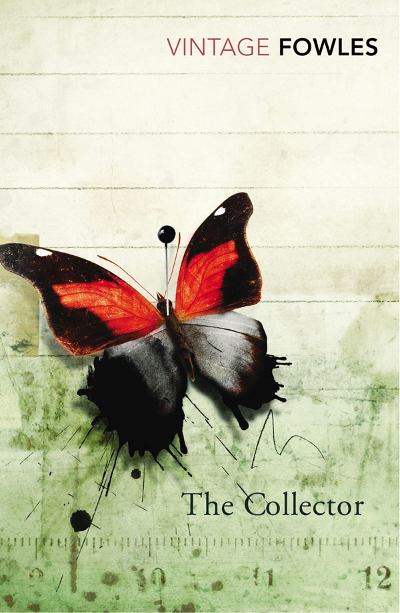The Collector
The novel is about a lonely young man, Frederick Clegg, who works as a clerk in a city hall, and collects butterflies in his spare time. The first part of the novel tells the story from his point of view.
Clegg is obsessed with Miranda Grey, a middle-class art student at the Slade School of Fine Art. He admires her from a distance, but is unable to make any contact with her because of lacking social skills. One day, he wins a large prize in the football pools. He stops working and buys an isolated house in the countryside. He feels lonely, however, and wants to be with Miranda. Unable to make any normal contact, Clegg decides to add her to his "collection" of pretty, petrified objects, in the hope that if he keeps her captive long enough, she will grow to love him.
After careful preparations, he kidnaps Miranda by drugging her with chloroform and locks her up in the cellar of his house. He is convinced that Miranda will start to love him after some time. However, when she wakes up, she confronts him with his actions. Clegg is embarrassed, and promises to let her go after a month. He promises to show her "every respect", pledging not to sexually molest her and to shower her with gifts and the comforts of home, on one condition: she can't leave the cellar.
After leaving Oxford University, Fowles taught English at a school on the Greek island of Spetses, a sojourn that inspired The Magus, an instant best-seller that was directly in tune with 1960s "hippie" anarchism and experimental philosophy. This was followed by The French Lieutenant's Woman (1969), a Victorian-era romance with a post-modern twist that was set in Lyme Regis, Dorset, where Fowles lived for much of his life. Later fictional works include The Ebony Tower, Daniel Martin, Mantissa, and A Maggot.
Fowles' books have been translated into many languages, and several adapted as films. He was named by the Times newspaper of UK as one of the 50 greatest British writers since 1945.
Clegg is obsessed with Miranda Grey, a middle-class art student at the Slade School of Fine Art. He admires her from a distance, but is unable to make any contact with her because of lacking social skills. One day, he wins a large prize in the football pools. He stops working and buys an isolated house in the countryside. He feels lonely, however, and wants to be with Miranda. Unable to make any normal contact, Clegg decides to add her to his "collection" of pretty, petrified objects, in the hope that if he keeps her captive long enough, she will grow to love him.
After careful preparations, he kidnaps Miranda by drugging her with chloroform and locks her up in the cellar of his house. He is convinced that Miranda will start to love him after some time. However, when she wakes up, she confronts him with his actions. Clegg is embarrassed, and promises to let her go after a month. He promises to show her "every respect", pledging not to sexually molest her and to shower her with gifts and the comforts of home, on one condition: she can't leave the cellar.
About the Author
was an English novelist of international stature, critically positioned between modernism and post-modernism. His work reflects the influence of Jean-Paul Sartre and Albert Camus among others.After leaving Oxford University, Fowles taught English at a school on the Greek island of Spetses, a sojourn that inspired The Magus, an instant best-seller that was directly in tune with 1960s "hippie" anarchism and experimental philosophy. This was followed by The French Lieutenant's Woman (1969), a Victorian-era romance with a post-modern twist that was set in Lyme Regis, Dorset, where Fowles lived for much of his life. Later fictional works include The Ebony Tower, Daniel Martin, Mantissa, and A Maggot.
Fowles' books have been translated into many languages, and several adapted as films. He was named by the Times newspaper of UK as one of the 50 greatest British writers since 1945.

